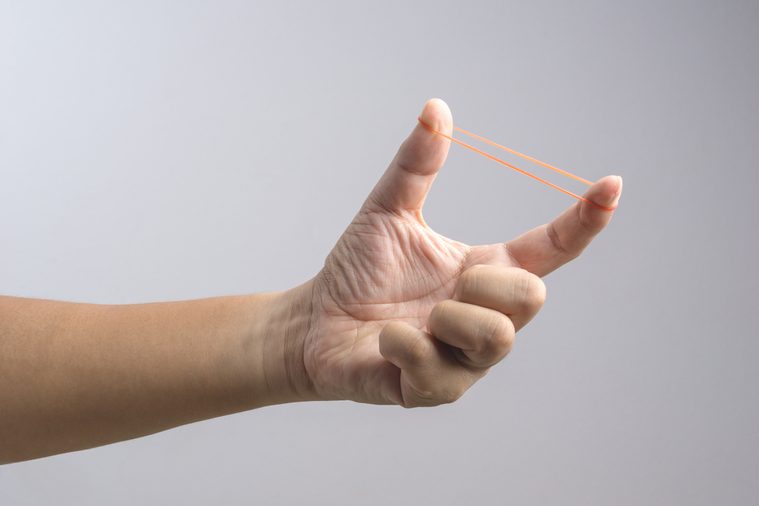
People with depression just need to “snap out of it”
Answer: False
This depression quiz question gets at one of the most common misconceptions about the condition. According to the National Institute of Mental Health, depression is caused by a combination of genetic, biological, environmental, and psychological factors. “However, the world still stigmatizes mental health disorders, even though science has shown us that their origins are biologically based,” says psychologist Deborah Serani, PsyD, award-winning author of Living With Depression. “We would never tell a person with cancer to just ‘snap out of their illness’ or tell a diabetic to ‘will their insulin to a healthy level.'” People experiencing depression can’t just make themselves feel better. Learn exactly what psychologists wish people knew about depression.

People with depression can be high energy
Answer: True
The typical image of depression is someone who’s down all the time, but that might not necessarily be the case. “We think of depressed people as having ‘low mood’ but there may be episodes of restlessness, which is similar to anxiety, but it is still depression,” says psychologist Susan Fletcher, PhD. Depressed people may also experience irritability, studies show. In addition, “depressed people can feel fear in their depression,” Dr. Fletcher says. “Thoughts might drop and they have trouble concentrating.” Other cognitive symptoms may include “negative or distorted thinking, distractibility, forgetfulness, slow reaction time, memory loss, impaired speech, indecisiveness, and poor reasoning,” Dr. Serani says. Plus, because depression is an “invisible” illness, people may strive to hide it from loved ones, coworkers, their social media, and insist they are fine—but they’re not. Here are the signs you could have high-functioning depression.
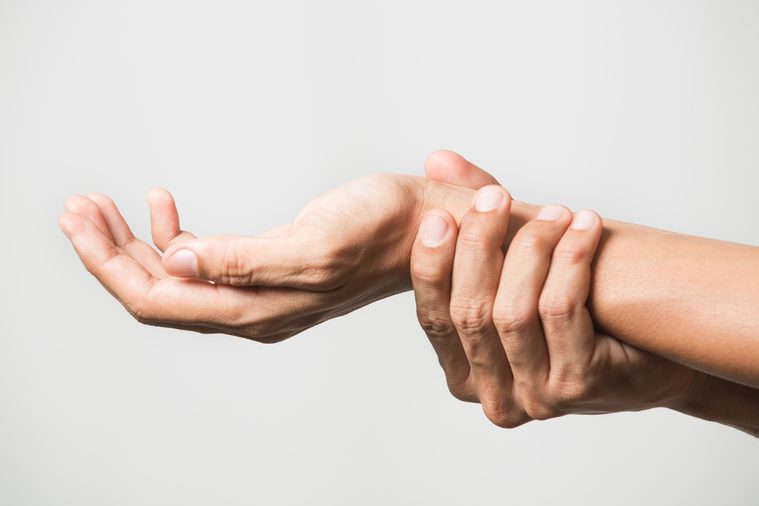
Depression doesn’t have physical symptoms
Answer: False
How are you doing on this depression quiz? Studies show that depression doesn’t just affect your mood; it causes physical symptoms, including aches and pains, heart palpitations, blood pressure changes, increased or decreased appetite, slowed gait, and low body tone, Dr. Serani says. “Neurotransmitters are the source of what makes mood unstable when someone has symptoms of depression,” Dr. Fletcher says. “These chemicals produced by the body cause emotional and physical symptoms.” The link between pain and depression can make the condition difficult to diagnose. In addition, diseases that cause chronic pain can also lead to depression, causing a vicious circle. Read about another surprising depression risk factor that’s right on your face.
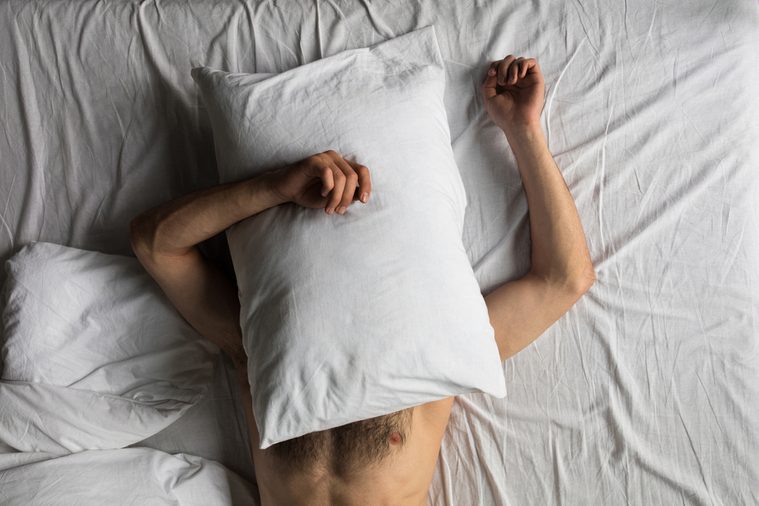
Depression is tiring
Answer: True
Another way depression manifests itself physically is with fatigue, interrupted sleep, or sleeping even too much. “Studies have linked cytokines, chemical messenger enzymes made by our immune system, to fatigue in depression,” Dr. Serani says. “Too much of the enzyme creates inflammation, which irritates our body, causing tiredness and fatigue, as well as aches and pains.” Dr. Fletcher says that unhealthy sleep patterns are one of the telltale signs when she begins to diagnose depression in a patient. “I always ask about sleep disturbance when I am assessing someone,” she says. This is what happens to your body when you don’t get enough sleep.

Depression makes you less interested in things you used to enjoy
Answer: True
A good reason to take a depression quiz like this is that some of the signs of depression can seem unrelated—like this one. If you or a loved one is suddenly not into things they used to take pleasure in, that can be a sign of the numbing effects of depression. “It’s called anhedonia, when you have a loss of interest in activities that you previously enjoyed,” Dr. Fletcher says. “This is because of emotional fatigue.” She says it’s important to recognize this isn’t just a preference (such as “I don’t like country music”) but rather a sudden loss of interest in something you used to love (such as not wanting to listen to country music after enjoying it for years). This is a subtlety that’s easily overlooked. “When someone has a loss of interest in something they previously liked, start asking questions instead of just dismissing it,” she says. Here are 10 ways to beat social anxiety.

Depression symptoms are similar for most people
Answer: False
Some of the ways depression manifests in women, men, and children may be the same, but there are notable differences to look out for. According to a recent CDC report, women are nearly twice as likely to experience depression than men. Hormonal, as well as psychosocial reasons, might be the cause, says the Mayo Clinic. Men, on the other hand, often don’t exhibit the typical “sad” symptoms of depression—they may appear instead as angry or aggressive, and are less likely to recognize or seek treatment. Research has found men also tend to overuse alcohol to deal with their depression more than women. Children with depression may refuse to go to school or pretend to be sick, cling to parents, get in trouble at school, or sulk. In teens, it can be hard to separate symptoms from “normal” teenage angst, but if you suspect depression, talk to your child’s pediatrician. These are the signs of childhood depression every parent should know.

People with depression act selfishly
Answer: False
Really, you deserve extra points for getting this one right on our depression quiz. Although their intense introspection can make them seem overly-focused on themselves, people with depression aren’t intentionally self-centered or inconsiderate of others. “Depression often makes people introspective because the brain and the body are fighting a significant illness,” Dr. Serani says. “This self-reflection can appear selfish, but in truth, the depressed person is grappling with a life-threatening set of symptoms.” Depression’s poor judgment and faulty reasoning that manifests in this rumination can even lead to suicidal thinking. Don’t overlook these 15 strange things that can literally rewire a person’s brain.

People fighting depression will ask for help
Answer: False
Because people with depression feel such a lack of self-worth, the disease can trick sufferers into thinking they are a burden to their loved ones and that they are “dragging others down” with them. To avoid this, they may remove themselves from social situations—and in a vicious circle, social isolation only serves to make depression worse. “Avoidance, withdrawal, and isolation are often found with depression,” Dr. Serani says. This shouldn’t be taken personally by loved ones. “It’s important for friends and families of loved ones who are depressed to remember that a great deal of brain functioning is impaired,” Dr. Serani says. Here are more ways to help someone with depression, according to psychologists.

Something sad or tragic can kickstart depression
Answer: True
This isn’t a trick question on our depression quiz: Although depression can often seem to have no known cause, a UK study showed a traumatic life event was the single biggest determinant of the condition. However, the way participants dealt with such traumas affected whether or not they developed depression. Once you’ve had depression, it’s important to learn “how to avoid toxic and triggering moments,” Dr. Serani says, in order to prevent further depressive episodes. “Some tips include being mindful of difficult days in the calendar year, limiting your exposure to sad or emotional media stories, movies, books, or television shows, and avoiding or diluting your time with toxic people,” Dr. Serani says. Don’t miss this one factor that predicts whether depression will return.
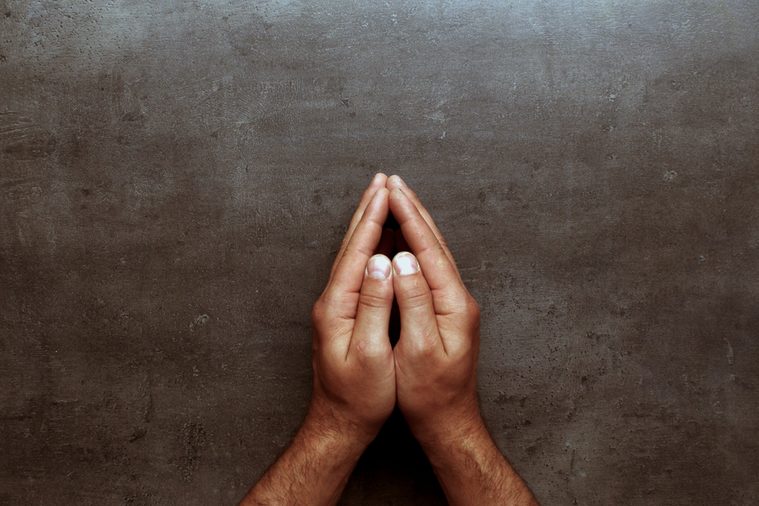
Depressed people feel guilty
Answer: True
People with depression often ruminate over what they perceive as their failures and feel a tremendous sense that everything going wrong is their own fault. Studies have even shown brain differences in people with depression may cause them to be more likely to self-blame. “Depression many times is excessive feelings of guilt,” Dr. Fletcher says. “If someone says, ‘I feel so guilty,’ ‘It made me feel so bad,’ ‘I’m just tired of what is happening,’ then I start to explore for more symptoms of depression.” One way not to respond? Here are 14 things to never say to someone with depression.

Depression is tough, but it rarely interferes with relationships or jobs
Answer: False
This is why if you think you have any issues with depression, you need to see a licensed professional. “Remember that depression is diagnosed when the symptoms interfere with daily functioning,” Dr. Fletcher says. “Everyone has some symptoms of anxiety and/or depression at some point, but most of the time the symptoms don’t interfere with daily functioning.” Some people may be able to hide their depression, but that doesn’t mean it’s not affecting their daily lives—so it’s important to be honest with yourself and your therapist about what you’re going through. In addition, be careful when “diagnosing” loved ones. “Don’t diagnose your friends if you hear them say one of the phrases [above],” Dr. Fletcher says. “I look for a trend overall in the way they talk about what is going on—I don’t make an assumption, or a diagnosis if it is just a random comment.” Still, if you notice any concerning behaviors, encourage your friend to see a doctor for a diagnosis. Here’s how to tell the difference between clinical depression and everyday sadness.
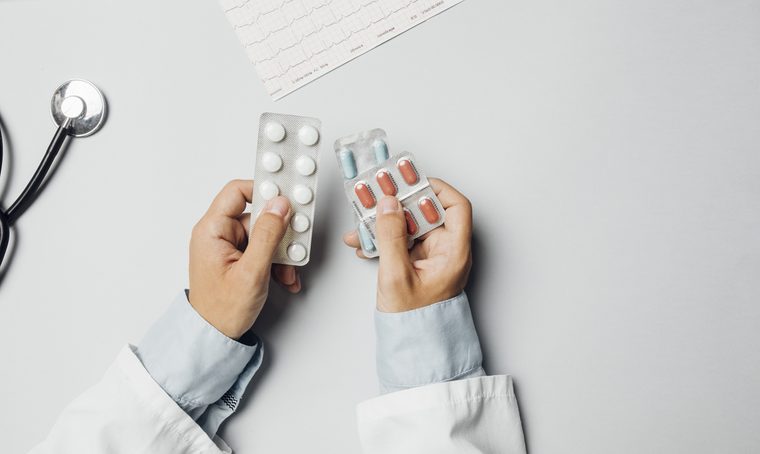
If you start taking antidepressants, you’ll have to stay on them
Answer: False
Depression can make you feel “stuck” in your life but, in reality, it’s a very treatable condition. This may include antidepressant medication, but not always. Therapy with a psychologist or psychiatrist is also recommended, and specific techniques, such as cognitive behavioral therapy, can help people with depression learn how to change their mental patterns. In addition, the National Institute of Mental Health stresses some self-care strategies: Being active and exercising, setting realistic goals, and spending time with others. “With treatment, difficult and dangerous behaviors reduce significantly,” Dr. Serani says. If you are living with depression, it’s important to care for yourself. “This means eating well, sleeping well, following your treatment guidelines, and taking medication if you’ve been prescribed,” as well as being kind to yourself, she says. Find out more science-backed ways to overcome depression naturally.
